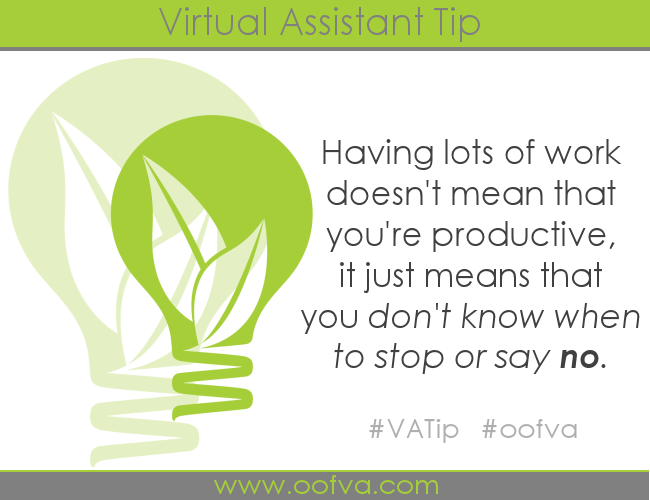Whether we admit it to ourselves or not, there are times where we are beyond busy, and it makes us feel important. Being able to share how busy we are with other people can also make us feel.. well, kind of good. Getting into the habit of being too busy starts to feel rewarded by our sharing, or complaining about it, to others.
In a strange way, we begin to like it, and we want to continue being super busy. We become so focused on how overcommitted we are that we actually don’t get that much work done. We also start to believe that if we’re ever not overcommitted, we’re also not important or productive.
Being overly busy makes us feel:
- Productive, because all of the additional tasks we force into our schedule make us feel like we’re getting more done.
- Important, because all important people are busy and have lots of things that they have to get done.
- Fully included, because if you’re involved with everything you’re not missing out on anything.
It’s important to remember that it is not the quantity of our work that’s important, it’s the quality. Having lots of work doesn’t mean that you’re productive, it just means that you don’t know when to stop or say “no.” It can be hard turning down jobs or requests from others, but at a certain point you have to start questioning why you’re doing half the things you’re committed to.

Saying “no” to someone might make us feel like we’re destroying something for them, but it’s not normally that dire. We are not obligated to say “yes” to every person that asks for something. Life can go on without us being involved in something. Realistically, you are the only person that can control and protect your own schedule.
In the spirit of learning to say “no,” here are six ways you can start:
1. By just outright saying it. If it’s too hard to come up with an excuse then don’t. You don’t need to explain to people why things don’t fit into your schedule or life.
“Thanks so much for thinking of me, but I simply won’t be able to make it.”
2. By complaining about how busy you are. You’re doing it with everyone else you might as well do it with people asking for your time. Explain that you’d love to say “yes” but you’re already overcommitted.
“It sounds like I would have a really great time, and thanks so much for the offer, but I’m just simply overcommitted right now, I can’t fit anything else in.”
3. By using budget constraints. Anyone running their own business or working for themselves understands how important it is to stick to budgets.
“Thanks for the opportunity it sounds like a great event. Unfortunately, I’ve already budgeted for something else this month and can’t free up those funds.”
4. By admitting how tired you will be. Busy people can’t keep going and going without stopping, so it’s ok to admit that you’ll be needing downtime.
“I’d really love to, and thanks so much for the chance, but I’m normally exhausted by X night of the week and I will be taking some downtime before my next project.
5. By blaming it on the ones you love. Family is something that pretty much everyone understands as an excuse for not doing things.
“That sounds great but I’m going to have to take a pass on it, sorry. We’re doing something special as a family that night and everyone is really looking forward to it.”
6. By explaining you have prior commitments. Once you have booked up your available time, you don’t have room for other commitments. Admitting this is completely acceptable business practice.
“That definitely sounds like a project that I would be interested in working on, but I’m completely booked out for the rest of the quarter. I’ve already committed to other projects and wouldn’t be able to give it the justice it deserves if I took it on. But please keep me informed.”
You only have so much time in your day, and every “yes” needs to be balanced with a “no”. The better you manage what you’re taking on or turning down, the more in control you will be of what you really want to work on.
Now that you have some ways to start saying “no,” how do you avoid getting caught up in the “busy” mindset again?
- Remember to enjoy the moment. If you’re trying to be everywhere at once, you’re never really going to enjoy where you are. Stop scheduling more stuff and enjoy what you’re already doing that much more.
- Keep your priorities clearly defined. The clearer your priorities are, the more likely you are to consider how new tasks fall in line with them. If doing something doesn’t move you forward on your priorities, how important is it?
- Start tracking your time. Using time tracking software can be a great way for you to audit your day and how you spend it. Where do you actually spend the most time? What’s the task that takes up all your time? Is that worth it to you?
- Bring back playtime. Studies show play time is actually really important to humans, but we always seem to forget this or associate it with being lazy. Don’t be afraid to slow down and have some fun, it doesn’t mean that you’re lazy. Taking a little time to play will help to revive your creativity and energy levels.
About Out of the Office Virtual Assistance:
 Since 2006, Out of the Office has offered ideas and ways to increase your productivity, decrease your workload, and work more efficiently. We nurture a successful business relationship, while continuing to grow as your business partner. We are focused on streamlining your administration, social media planning and execution, content writing and offering creative solutions for your business success.
Since 2006, Out of the Office has offered ideas and ways to increase your productivity, decrease your workload, and work more efficiently. We nurture a successful business relationship, while continuing to grow as your business partner. We are focused on streamlining your administration, social media planning and execution, content writing and offering creative solutions for your business success.
Image Credit: Copyright: Vector Image by StockUnlimited

